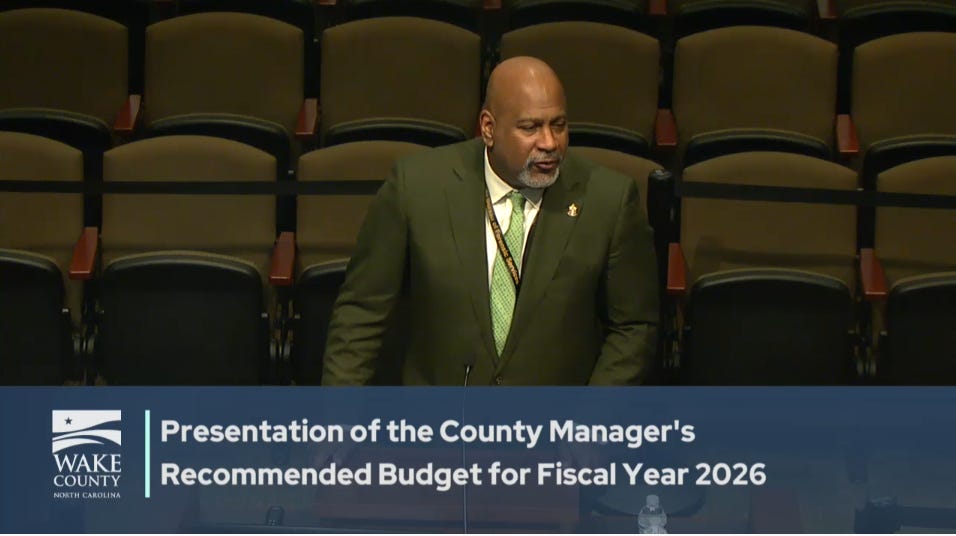Wake County Proposes $2.16 Billion Budget for FY2026 Focused on Growth, Infrastructure, and Education
Public hearings are set for May 19 and 20; commissioners expected to vote on final adoption on June 2
Holly Springs, NC, May 8, 2025—Earlier this week, Wake County Manager David Ellis unveiled a $2.165 billion recommended budget for Fiscal Year 2026. The budget proposes targeted investments in education, public safety, health services, and infrastructure while maintaining a cautious financial approach amid national economic uncertainty.
Setting the context for the budget, Ellis noted that Wake County's population has now surpassed 1.2 million residents, growing by about 66 new residents every day, faster than pre-pandemic levels. The Raleigh-Cary metro area also ranks the third fastest-growing area nationally for residents over 65. This rapid growth fuels strong economic activity but places mounting pressure on schools, public safety services, housing, and infrastructure.
Ellis told county commissioners that the proposal represents “countless conversations, hundreds of hours of work, and a multitude of decisions over the past 10 months.” The budget is built around Wake County’s 2024–2029 Strategic Plan, designed to respond to rapid population growth and changing community needs while safeguarding fiscal stability.
Property taxes remain the county's primary revenue source, projected to generate approximately $1.617 billion in FY2026, accounting for 83.1% of General Fund revenues. Residents would see a slight increase in the general property tax rate from 51.35 to 51.60 cents per $100 of assessed value, driven by a voter-approved library bond.
The proposed budget reflects continued expansion: Wake County’s tax base is expected to grow by 2% to reach $295 billion. Real property valuation is expected to rise by 1.5%, while personal property valuations, including business equipment, are forecasted to jump by 6.6%. The collection rate remains one of the highest in the state at 99.75%.
Education represents the largest single expenditure in the FY26 plan, with funding for Wake County Public Schools and Wake Technical Community College totaling $791 million. That figure includes a $35 million increase in direct operating support for the public school system. However, the Wake County Board of Education had requested nearly $59 million in additional county funding to cover salary increases, enrollment growth, and inflationary pressures. The recommended county funding falls about $24 million short of the school system's request, leading to concerns among educators and families that the district may face challenges maintaining student services, support programs, and competitive pay.
Capital investment is another major focus. The proposed budget increases funding for new school construction, library expansions, and facility upgrades, raising total capital project spending from $545 million last year to $699 million in FY2026—a jump of $154 million. Voters' approval of a $353 million library and parks bond will fund five new libraries and renovations for nine existing ones, helping meet the needs of a population growing by about 66 people per day.
Public safety services would also expand under the plan. The budget proposes adding 60 new Emergency Medical Services staff positions—paramedics and EMTs—to keep pace with call volume and ensure rapid emergency response. A 1.5-cent increase in the countywide Fire Tax District rate is also proposed to fund new fire infrastructure and personnel.
Health and human services remain a high priority, although some pandemic-era programs face reductions. The county plans to continue its investments in housing affordability and homeless services, including supporting the Continuum of Care program. However, federal COVID-19 relief funds have expired, and Ellis warned, “With our current budget constraints, some programs will receive no county dollars in FY26 and some will be funded at a reduced level.”
One example is the Bridge to Home housing stabilization program, which will see its funding cut in half compared to previous years. “Bridge to Home is a good example," Ellis said. "The NACo award-winning program has been very successful in helping our vulnerable residents find stable housing, but we can only afford to fund it at 50 percent of what we've provided since the pandemic."
Employee compensation is another area seeing restrained growth. Performance pay raises will range from 1% to 2.5%, with a maximum of 3.5% for exceptional work, marking the lowest proposed performance pay plan since the pandemic.
Despite the tight financial landscape, the county will continue to honor its financial obligations, including contributing to the North Carolina Local Government Retirement System for employee pensions, maintaining the Law Enforcement Officer Special Separation Allowance, and transferring $3 million into the retiree health care trust fund to cover future Other Post-Employment Benefits (OPEB).
Public hearings on the proposed budget are scheduled for May 19 and May 20. Commissioners are expected to vote on the final adoption on June 2. Residents can submit feedback online at wake.gov/budget.
Summing up the challenge of balancing growth and fiscal responsibility, Ellis said, “Our more cautious fiscal approach won’t stop us from advancing our strategic plan.”
Fiscal Year (FY) 2026 files can be accessed by clicking here.
Contacts for Feedback or questions:
David Ellis
Wake County Manager
Email: david.ellis@wake.gov
Lindsay Mahaffey
Wake County Board of Education (District 8)
Email: lmahaffey@wcpss.net
Lynn Edmonds
Wake County Board of Education (District 5)
Email: ledmonds2@wcpss.net

